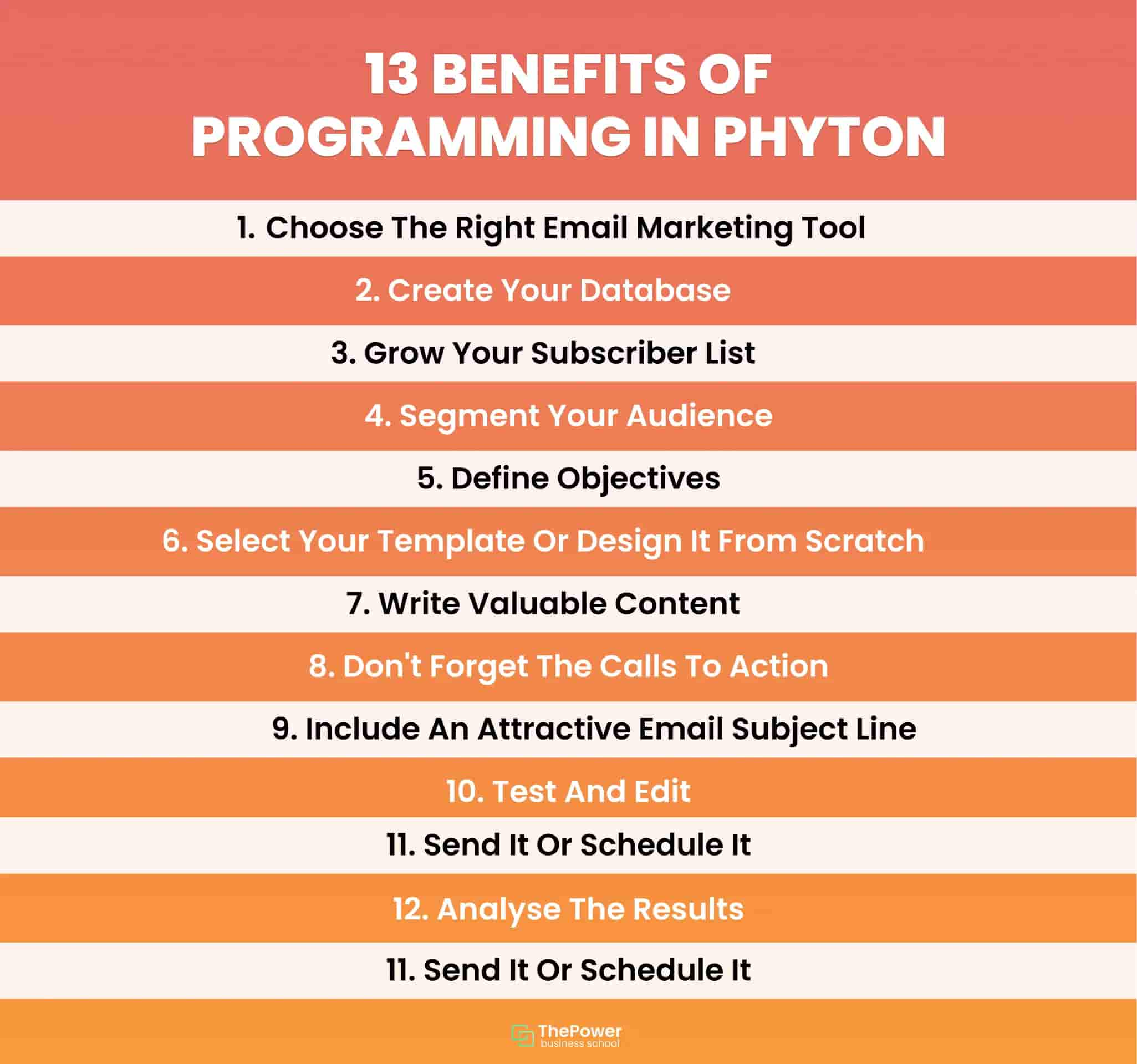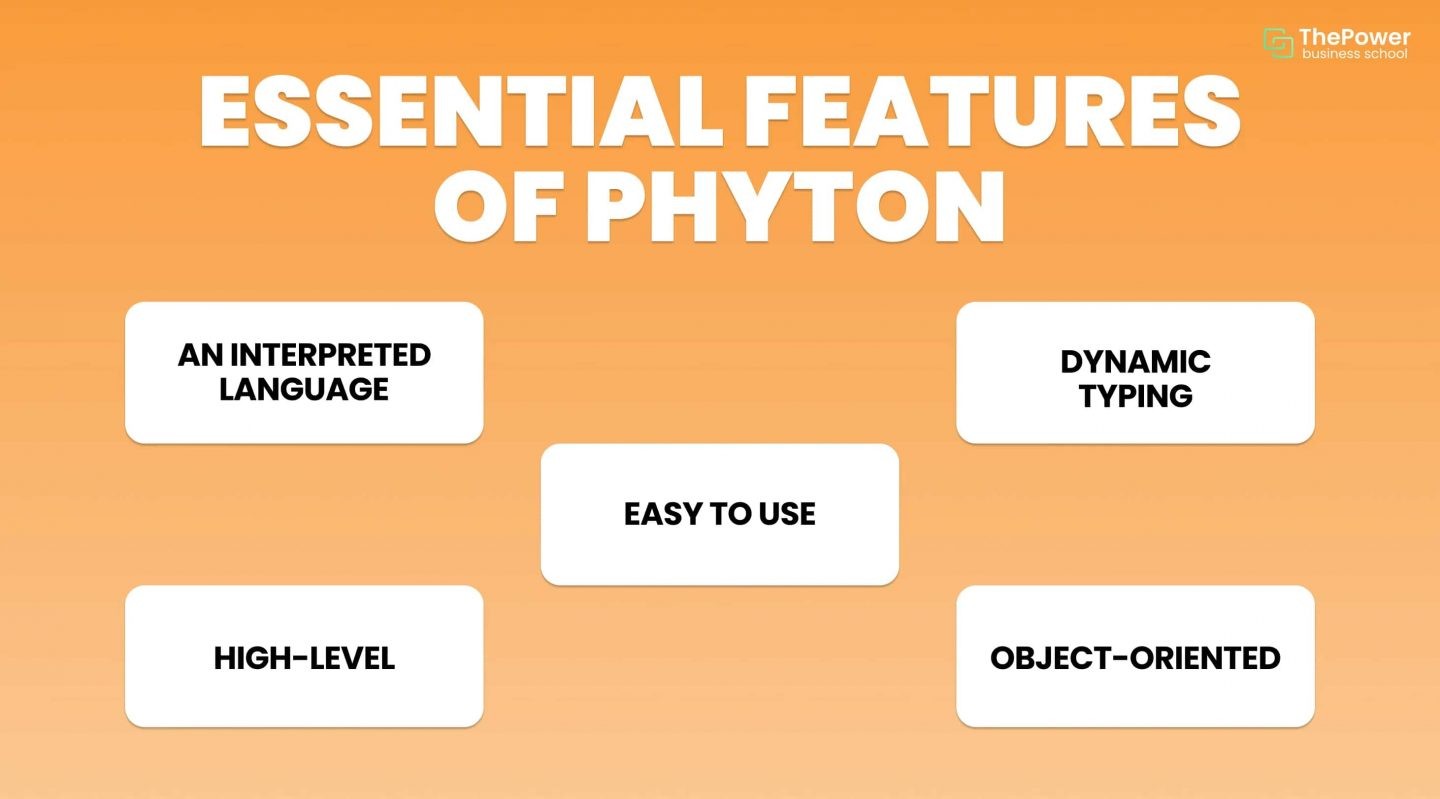What is Phyton programming and 13 reasons to learn how to use it right now

Franco Brutti
Are you looking for the best language to start programming? It's time to stop looking because Phyton is the ideal one for you.
It's a language that is gaining more and more followers in the world of programming, and it has many benefits that you cannot miss.
Can you imagine creating a line of code just by writing in English? Well, something similar is what you can do with Phyton, so you can forget about all those complicated commands.
Make yourself comfortable and get ready to create something out of nothing and provide solutions to the whole world from your own computer.
What is Phyton?
It's a programming language used in many areas, from software development, web applications, data science and machine learning.
Python is characterised by the fact that it can be used on different platforms, it's efficient and very easy to learn. Its syntax is very similar to English syntax, so you will often feel like you're having a conversation with someone rather than programming.
Its development speed is quite high, which allows you to optimise many elements of your website to offer a better user experience. In addition, you can download it for free and it's easily integrated into any system.
Unlike other languages, this is an interpreted language, so it's not necessary to compile it to open the applications you develop with it, because you'll be using a software called interpreter that automatically translates it into machine language.
13 Benefits of programming in Phyton
The truth is that programming in Phyton has many benefits, especially if you compare it with other languages that exist today. Let's take a look at some of these benefits below:
1. English-like syntax
The first thing you should take into account is that Phyton has a syntax that's very similar to the syntax of the human language. So, unlike with other languages, you won't have to learn complicated command lines to give instructions to the computer.
Does it have standards? Of course, but if you know the basics of programming you will start developing in Phyton in less than 30 minutes. Download it and find out how easy it is.
2. Higher productivity
Closely related to the previous point, with Phyton you will be much more productive because the codes are shorter and simpler. Being so similar to English, it only requires a few sequences to shape the program you want to create.
It will take some practice to get used to its features, but once you get the hang of it there's no turning back.
3. Reusable code for any task
One of the big problems of traditional programming languages is that you have to write code from scratch, which becomes a slow and tedious process.
With Phyton you will save a lot of time because there's a standard library containing hundreds of reusable codes for all kinds of tasks.
So, forget about programming from scratch and optimise your time with Phyton.
4. Combining with other languages
On the other hand, as a developer you have the possibility to use Phyton together with other languages to create a much more complete program adapted to the needs of your users.
Java, c++ and C are some of the languages you can combine. Use them and see how they behave.
5. Millions of developers around the world
Undoubtedly this is one of the greatest benefits. Python is one of the most widely used languages today, which means that around the globe there is a community of millions of developers who have experience in the subject.
So, everyone is willing to share their knowledge, it's just a matter of joining a forum or group and asking for help and you will see how this people will be available for you immediately.
6. Useful resources on the internet
On the other hand, another of the benefits of Phyton is that on the internet you will find several materials that will help you create the programme you dream of.
Just go to youtube or type the keyword on Google and you will see all the resources that will appear. From tutorials, webinars, articles and hundreds of tips to clear up any doubts you may have.
7. Transferring to other operating systems
In addition to all this, Phyton gives you the possibility to port your project to various operating systems such as Windows, MacOs, Unix and Linux.
8. Its possible uses
There are many uses you can give to Phyton in your day to day life. Make yourself comfortable and discover them in the following list.
9. Server-side web development
Server-side web development includes all the backend functions that all sites must run to display content to the user.
This way, Phyton allows you to communicate with other platforms, manage databases and protect user information when you send it over the network.
In this regard, the programming language is very useful for developing server-side code as it provides you with several libraries that have prescribed code that you can use in various backend functions.
10. Automation with scripts
Scripts are a treasure trove for programmers. They are commands that allow you to automate many of the tasks you perform on a day-to-day basis, so you no longer have to write code from scratch to do simple activities such as:
Renaming a large number of files
Converting one document into another in seconds
Deleting duplicate words
Simple mathematical operations
Sending emails
Downloading content
11. Data science tasks and machine learning
On the other hand, with Phyton you can execute data science tasks and add machine learning.
Basically, this consists of extracting knowledge from data while teaching computers to execute precise tasks with this information. This way you can perform data science tasks such as the following:
Correcting and removing incorrect data, which is also called data cleaning.
Choosing and extracting specific features from the data
Look for statistics on the information.
12. Software development
Yes, with Phyton you can develop programs and execute important activities such as:
Tracking bugs in the software code.
Developing the program automatically
Managing projects
Developing prototypes
Running desktop applications.
13. Software test automation
Another use for Phyton is software test automation.
This is the process of checking whether the results of the program are in line with the projection that was made at the beginning of the whole thing. This ensures that the program is free of errors.

Essential features of Phyton
Phyton is a very particular language and you can verify this with its features. Discover some of them below:
1. An interpreted language
First of all, Phyton is a 100% interpreted language. This means that it executes the code line by line directly, so if there are errors in some of the commands the execution will stop immediately.
What are the advantages of this? Well, you will be able to detect the error just in time before the project is released, which saves you time and headaches.
2. Easy to use
Phyton is one of the easiest languages to use, even easier than web programming languages like html because most of its commands are related to the English language.
Also, it doesn't require keys or strange instructions, so it will be like having a conversation with the computer.
3. Dynamic typing
On the other hand, when you program with this language you don't have to announce the types of variables as the system itself selects them at runtime, which speeds up the process of writing a program.
4. High-level
You can't forget that Phyton is a high-level language, which means that it is closer to the human language than other projects.
This way, you forget about those complex processes such as underlying functionalities, memory management and data architecture.
5. Object-oriented
The great thing about this language is that it is object-oriented, but it also allows for other types of code such as structured and functional programming.

What are the origins of Phyton?
The origins of this language are quite particular. Phyton may seem recent to you, but the truth is that it is a code that has been around on the market for many years.
Its origins go back to the early 1990s when a CWI worker named Guido Van Rossum came up with the idea of creating a new language based on an earlier project called "ABC" that he ran with his own co-workers.
The goal was simple, to develop a programming language that was simple, easy to learn, easy to write and easy to read without this being a limitation to create any kind of app.
Of course, it was all very nice in theory, but the reality was that the hardware of that time couldn't sustain a project with these characteristics, which meant that Phyton was relegated until a few years ago.
With the advancement of devices, it has become one of the most important languages today.
Why is Phyton so in demand?
Now that you've seen this information you can deduce why so many people and companies are so interested in learning to program in Phyton.
The reason is simple: it's one of the languages that has the closest relationship with several trends that have great potential such as machine learning, data analysis and artificial intelligence.
These topics require professionals with very specific knowledge, which has led companies to go to the market to find people who know how to program in this language.
In fact, according to a study by Linkedin, in 2020 the demand for Phyton developers increased by 48% compared to the previous year. Imagine what the numbers are like today.
Steps to learn Python from scratch
Nowadays there are many tutorials on the internet that will show you how to learn Phyton, but almost none of them will tell you the steps you have to follow to get the most out of it.
However, you don't have to worry, because that's what we're here for. Pay attention to what you need to do to learn the basics of this language below:
1. Think about the reasons
The first thing you have to do before starting any project is thinking about your reasons for starting it.
The same goes for Phyton, you need to know what your inner motives are for taking this step.
Think about what you want to achieve, what impact you would like to make on the world, and then list this down. This will help you stand firm when the tough times come.
2. Understand the basics
Understanding the basics of the language is important to become an expert developer.
You need to understand the most commonly used syntax, data types, variables and functions.
It may seem like a slow process, but in no time you will be ready to apply your knowledge.
3. Apply the knowledge
Once you have the theory in your head, the best thing to do is apply your knowledge through a new project.
Choose a goal and create a program that fulfils some function, whether it is to optimise the database of a website or a software that greets the students attending a school.
Here you will find out how far you are in the field and how far you can go in the process.
4. Collaborate with others
Last but not least, you need to collaborate with others.
After you have your programme it is essential that you talk to other colleagues to compare the results. They are more experienced than you and will be able to correct any mistakes you may have made.
Phyton is definitely one of the most complete languages out there, so it's time to check it out. We love the fact that you can do a lot of things without having to mess around with strange commands.
We are sure that in less than a week you will be ready to start.
Have you decided to program in Phyton yet? Let us know in the comments:
Looking for something specific?
16 feb 2024
12 dic 2023
1 dic 2023
20 nov 2023
17 nov 2023
12 sept 2023





